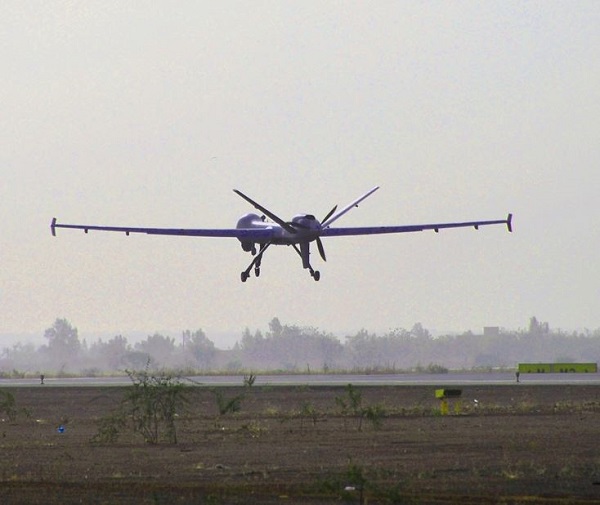
MQ-9 Reaper block 5 drones of the Air and Aerospace Forces are still not authorized to fly in France
In 2017, after three years of heavy use in the Sahel as part of Operation Barkhane, male drones [Moyenne Altitude Longue Endurance] Air and Space Force MQ-9 Reaper Block 1 [AAE] It has been authorized to operate in French airspace after obtaining a Certificate of Airworthiness from the State Aviation Safety Directorate [DSAE]. This made it possible, for the first time, to include one of these aircraft in the Special Air Safety System [DPSA] It was held for the military parade on the Champs-Elysées that year.
Since then, it was decided to transfer the Reapers MQ-9 to the so-called “Block 5” standard. Thus, these aircraft have been modernized with a new electrical system, increased capabilities, including the ability to carry Hellfire air-to-surface missiles, GBU-48 bombs with laser guidance and GPS, as well as the 250 kg GBU-12 plus software and sensor suite. More efficient. It is clear that it is almost a new drone … In order to fly it in France, you must again have a certificate of airworthiness. Obviously, this poses a problem that has not been resolved to this day.
And so, during a parliamentary hearing in June 2021, Joel Barry, then Delegate General for Armaments, explained that the difficulty with the MQ-9 Reaper Block 5 came from its American equipment. “The case shows the degree of our dependence on this type of operation, in the face of a completely new software configuration and a level of quality that we do not know if it is sufficient, while we are responsible for the level of security associated with the implementation of the materials,” he had developed.
“We had to investigate how Reaper Block 5 could be allowed to be used in operation in Mali, despite the uncertainty associated with the program. We therefore submitted a technical opinion allowing the recruitment agency [c’est à dire l’AAE, ndlr] To use this drone, only in operation, ”he added. But then he insisted that “it is out of the question that it will fly over the national territory, because we cannot guarantee the flight safety of such equipment.”
Two years later, we’re still at the same point. Currently, the AAE – more specifically the 33rd Reconnaissance and Observation Wing – still has three MQ-9 Reaper Block 1s, which also recently participated in the GBU-12 launch campaign at Captieux. Three more have been sent to the United States to be brought to Block 5 standard. As for the last six, already “modified”, three have been deployed to Niger and three to the 709 Air Base Konyaak … without being able to use them, for lack of a certificate of airworthiness Airworthy in French airspace.
“In France we have three Block 5s but we don’t have permission to fly yet: we are awaiting approval of the Certificate of Airworthiness to operate in metropolitan airspace. A new software version must be integrated on these devices, then tested and validated by the DGA [Direction générale de l’armement] Explanation of the commander of the 2/33rd UAV Squadron Savoy to the specialist magazine Raids Aviation.
“Once we have ‘clearance’ to fly with Block 5s in France, we will send the last three Block 1s under retrofit,” the officer added.
The concern is that there is a delay in integrating Hellfire missiles and GBU-49 bombs into Reaper Block 5.
“We are counting on the certification of airworthiness to incorporate these new weapons,” confirmed the commander of the 2/33rd Savoy. “The Hellfire missile will be integrated first, and then the GBU-49 missile,” he said.
For being so, A.J Senate reportpublished in June 2021, denounced “airworthiness and air traffic integration rules” that were too “restrictive” for military drones.
These “are subject to specific rules, inspired by the rules of civil aviation, with respect to their airworthiness – and their circulation in airspace. These rules are often seen as too restrictive in that they slow down the operation and use of these systems,” he noted. Its authors, before recommending “relax”.
The “certification phase, which is necessary for the safety of the areas they are flown in, is sometimes seen as too long, while the armed forces are often in dire need of the equipment involved” and “restrictions are an impediment to the use of drones nationally.” Region For training and training but also for surveillance missions [postures particulières de sûreté aérienne et de sauvegarde maritime, missions intérieures comme Harpie…] He was still supporting the senators.

“Organizer. Social media geek. General communicator. Bacon scholar. Proud pop culture trailblazer.”
